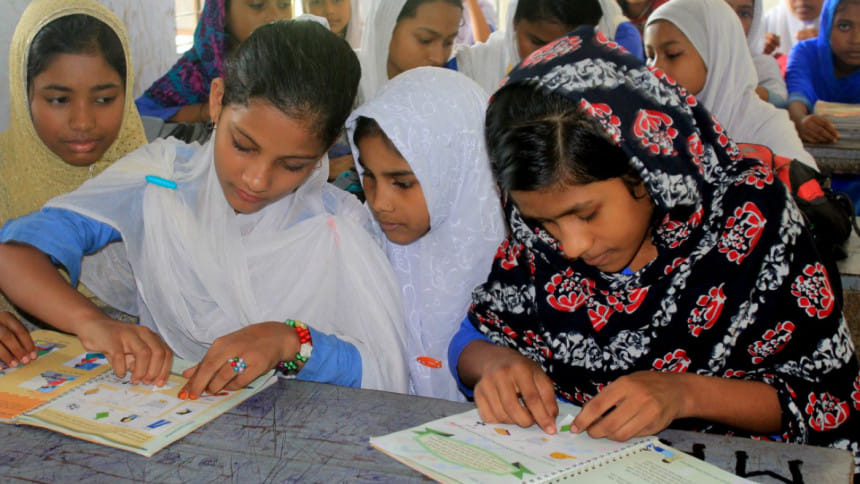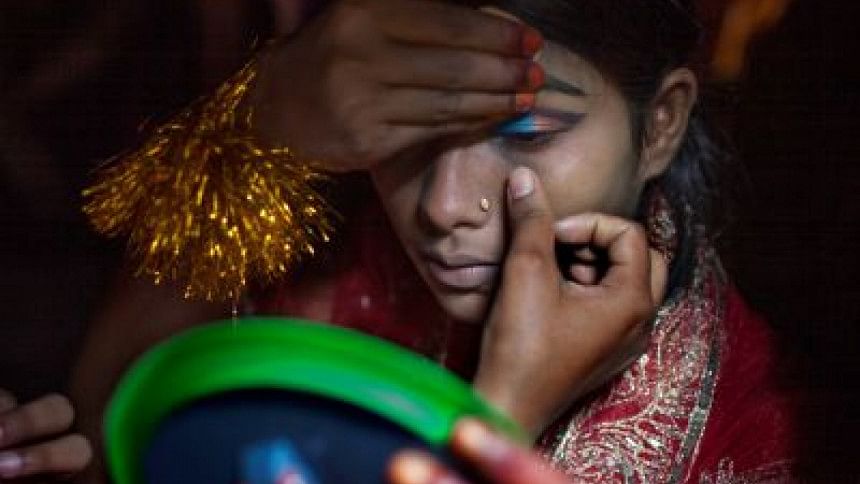BE BOLD FOR CHANGE

“Ask for what you want and be prepared to get it.” said Maya Angelou, the famous civil rights activist and poet. Her statement gives us an idea of why we need to Be Bold for Change - this year's theme for International Women's Day celebrated on the 8th of March. What is it the girls and women of Bangladesh are asking for and where is our boldness required for change?
CHANGE 1 – Invest in girls
According to UNFPA's Demographic Impact Study (2015), Bangladesh's already very large population will further grow and reach 170 million by 2021, with adolescents accounting for more than 20% of the population. A key challenge for Bangladesh is to address gender norms and practices that violate adolescent girl's rights, promote violence against them, restrict their economic opportunities and harm their health and wellbeing. Studies, including the one conducted by ICDDR,B, have shown that violence will become a 'norm' and continue to be accepted and condoned in a society, unless violent acts are questioned and dismissed from a very early age. A core issue in this regard is the lack of opportunities for adolescent boys and girls to develop skills needed to form respectful relationships and be civic-minded in their behaviours, skills which are essential both in their private social relationships and later at the workplace.
Deliberate and targeted action is needed to provide life skills education, including sexual and reproductive health education to adolescent boys and girls – so that values of respect, tolerance and understanding are imparted in them at the right age.
Investing in adolescents, especially girls, is essential if Bangladesh is to reap a dividend from the current demographic window of opportunity arising from the large adolescent population and overall reduction of the dependency ratio. These investments should be made particularly in their education, health and life skills development, which will also contribute to increasing their future employability. UNFPA works with partners to introduce gender-sensitive modules and life-skills education into formal and non-formal education,so that adolescent boys and girls grow into non-violent, healthy and well-informed adults.

CHANGE 2 – End child marriage and keep girls in schools
The Bangladesh Parliament recently passed a revised Child Marriage Restraint Act which, while maintaining the legal age of marriage for girls at 18 and boys at 21, allows for marriage at a younger age under “the special circumstances”. UNFPA, along with many other development partners and civil society organizations, remains concerned about this exception clause and its potential negative impact on children's wellbeing, especially girls. UNFPA will fully support the Government to draft the Rules to implement the revised act, to minimize harm to girls and boys,and also develop a national plan of action to end child marriage.
Today, the rates of child marriage among Bangladeshi girls are still among the highest in the world, fueled by poverty, parental desire to protect girls from harm and sexual harassment and certain traditional practices. With 59% of women aged 20-24 married before the age of 18 years (BDHS 2014), child marriage robs the adolescent girl of her childhood, limits her educational and income-generating opportunities and exposure to social networks and support. Young brides often become young mothers at the expense of her education, her health and the health and well-being of her children. The high rates of adolescent fertility in Bangladesh combined with the consequences of early and multiple pregnancies highlights the urgent need to keep girls in school, provide them with life-skills education and delay the age of marriage and child bearing through increased access to and demand for adequate family planning and sexual and reproductive health information and services.

There is a need to transformnegative attitudes regarding pulling girls out of schools, accepting child marriage, forcing young brides to prove their fertility immediately after early marriage, and condoning domestic violence. These attitudinal changes have to be triggered at the community level and especially amongst adolescent girls by enabling them to understand their rights and feel empowered to express and exercise their choices. UNFPA works through global and national programmes to raise awareness about the negative impact of child marriage on the health and future of the girls and the country as a whole.
CHANGE 3 – Ensure a safe environment for girls and women
In order forthe Government to achieve its priority to make Bangladesh a Middle-Income Country, it needs to urgently address the low rate of women's participation in the formal labour market, which currently stands at only 36%. The economy is missing out on an enormous opportunity for growth and innovation. The status of women in the society is kept low, and chances for families, especially the poor, to raise their income are underutilized. Reasons for the low female labour force participation are most often traced back to traditional attitudes to women's employment, poor working conditions, sexual harassment and discriminatory wages.
Increasing the female labour force participation necessitates the development of women's marketable skills and an improvement in working conditions and environments, including adopting and implementing specific legislation to protect women from sexual harassment at the workplace. UNFPA is currently partnering with the Ministry of Labour and Employment to work towards providing women with access to sexual and reproductive health information and services and preventing and responding to gender-based violence at the workplace, especially in the ready-made garment sector, one of the big employers for women in the country.
Violence against women, as a major concern for girls and women in Bangladesh, affects all areas of life. The 2015 Violence Against Women Survey conducted by the Bangladesh Bureau of Statistics with UNFPA support, shows that 73% of ever-married women experienced aform of violence by their husband. This includes physical, sexual and emotional violence. Other studies have shown that girls are sexually harassed in public space, including in schools and universities.
Overcoming the scourge of gender based violence requires the adoption of legislation that criminalizes all forms of violence against women and girls. Moreover there need to be assurances that the perpetrators are prosecuted and adequately punished and that the victims have access to immediate protection, treatment and rehabilitation, and means of redress, including compensation, as reiterated by the Committee on the Elimination of Discrimination against Women (CEDAW) in their November 2016 report.
Changes need to take place at all levels of society. Several international conventions and bodies, such as the Commission on the Status of Women (CSW) and CEDAW, are monitoring women's empowerment and gender equality and have made suggestions to the Government of Bangladesh on improvements that need to take place, in order for the SDGs as well as national development goals to be achieved. These include: to change differing definitions of a girl child and boy child, which is especially relevant with regard to the age of marriage, address the lack of jurisdiction of special tribunals for violence against women, criminalize sexual harassment of women and girls in the workplace and in schools and ensure reliable data on gender-based violence is available. Moreover the importance of women's economic empowerment is highlighted as a crucial component for the overall socio-economic development of the country. Access to decent, good-quality paid work is the most important factor in economic empowerment, along with the elimination of violence against women.
On a more societal level, gender-inequitable stereotypes and harmful practices need to be changed, especially by working with young people and those who have influence over them. Priority, at this time, needs to be given to marginalized girls and women. Combating violence against women and girls, including the elimination of harmful practices, such as child marriage, is a key so that girls and women, who make half of the population, play a powerful, valuable and bold part in society and economy.

 For all latest news, follow The Daily Star's Google News channel.
For all latest news, follow The Daily Star's Google News channel. 



Comments